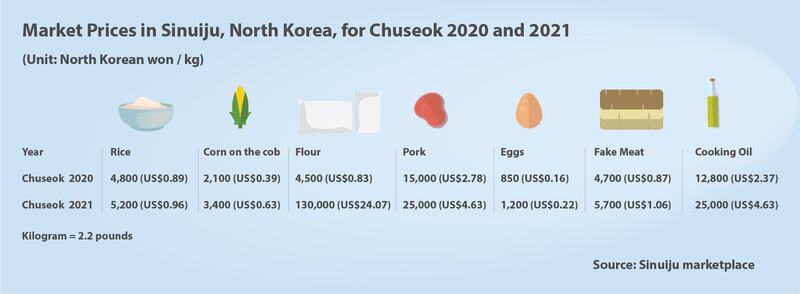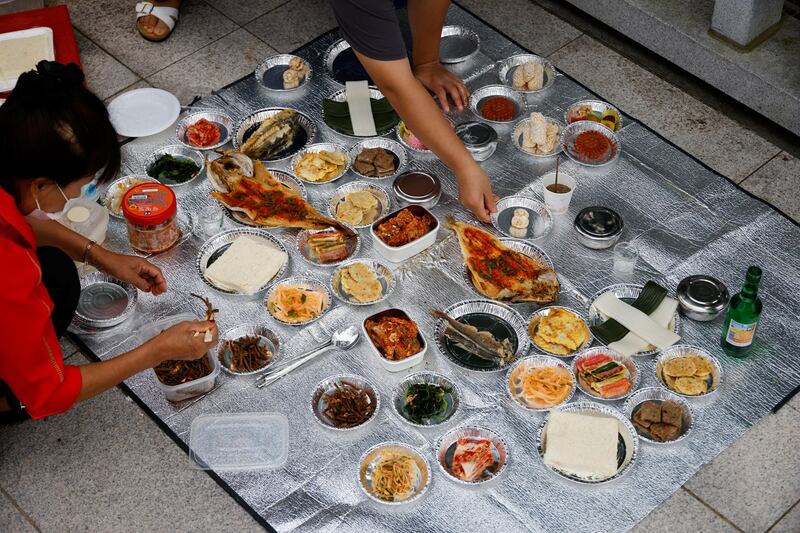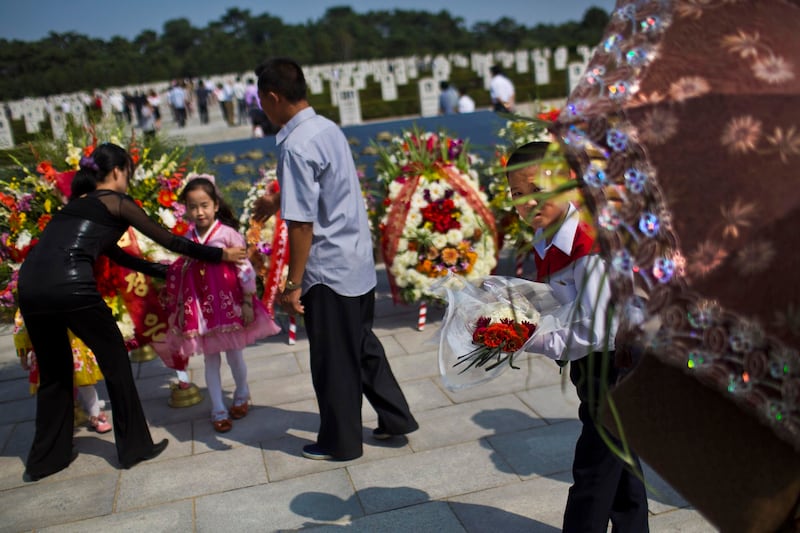Major food shortages in North Korea left many of the country’s citizens unable to properly celebrate one of its most important holidays, sources in the country told RFA.
Chuseok, Korea’s version of the fall harvest holiday also celebrated around the autumn equinox in China and often likened to Thanksgiving in the U.S., is an important Korean holiday for honoring ancestors.
The holiday, which falls on Tuesday this year, brings extended families together to prepare an elaborate “jesa” table of traditional food offerings to honor their ancestors with a small ceremony at home or at family graves.
But North Korea is chronically short on food and has seen starvation deaths this year in the wake of the closure of the Sino-Korean border and suspension of trade with China in Jan. 2020 to prevent the spread of COVID-19.
In the northwestern border town of Sinuiju, food prices are about twice as expensive as they were last Chuseok and citizens must find ways to honor their ancestors without the proper food offerings, and celebrate the autumn feast, without the feast.
“The price of pork started to rise from the beginning of this month because of Chuseok,” a resident of Sinuiju told RFA’s Korean Service Sunday.
“Rice, eggs and fake meat have all risen today, just one day before Chuseok,” said the source, who requested anonymity to speak freely.
Traditional observance of the festival requires families to prepare a table with many different kinds of foods, including fresh fruit, several kinds of meat and seafood, and large portions of vegetable dishes.
But the high prices in North Korea are forcing people to cut corners.
“I bought just a little bit of rice and meat so I can prepare a jesa table at my mother’s grave in the mountains. Every jesa needs seafood, but prices have skyrocketed, so I could not even afford to buy it,” said the source.
The rise in prices over the last year at the Sinuiju market was gradual for most food items, but luxuries like meat and seafood increased sharply as the holiday approached.
Soaring prices

In August, the price of a kilogram (2.2 pounds) of pork was 20,000 won (U.S. $3.70), but it rose to 25,000 won ($4.63) in September. A frozen pollack rose from 10,000 won ($1.85) to 20,000 won ($3.70).
“The price of pork is so high that it seems that there are many residents who cannot buy meat, even on Chuseok!” the source said.
“Instead, fake meat made from bean scraps is cheaper, so people are serving fake meat dishes at jesa and families are eating the fake meat in their feast,” said the source.
A resident of Musan county in the northeastern province of North Hamgyong said people there were critical of the government for not caring about their plight.
"The price of rice at the local marketplace did not rise significantly, but the price of flour rose because we have to make buchimgae and kkwabaegi," said the second source, referring to Korean vegetable fritters and twisted donuts.
“They say the people are having a hard time just to make a living, but the country is wasting its money firing missiles,” the second source said, referring to North Korea’s test launches last week of long-range cruise missiles and train-fired ballistic missiles.
"The people blame [North Korean leader] Kim Jong Un, who is ignoring their livelihoods and bragging about firing missiles off a train on the 15th." added the source.

Other residents told RFA ahead of the holiday that they were depressed that they cannot afford to set a proper jesa table.
“Chuseok is only four days away, but it is so gloomy, and nobody is in the holiday spirit,” a resident of Chongjin in North Hamgyong told RFA Sept. 17.
The coronavirus pandemic has reduced large swathes of the North Korean population to poverty. The Sino-Korean border closure did not only cause food shortages, it also stopped people from making a living buying and selling Chinese goods, and cut off North Korean industry from raw materials and components.
Commerce in entire towns dried up as a result, and ships in harbors began to rust from disuse.
Money is tight for almost everyone in Chongjin, the Chongjin source said.
“A resident of Bugo village in Chongam district told me that no matter how difficult the circumstances were, he was always able to prepare songpyeon [handmade rice cakes], fruit, fish and vegetables for jesa,” the Chongjin source said.
“But this year he could only put a single bottle of alcohol on the table with no food, because he didn’t have enough money, he said with tearful eyes,” the Chongjin source said.

Placing offerings on family graves is also a Chuseok custom that has been hit by the hardship.
“Until a few years ago, you could see impressive displays at graveyards on Chuseok as residents carried a large variety of food on their heads and backs,” the Chongjin source said.
“But the number of grave visitors has gradually decreased and this year, so many residents are only bringing a bottle of alcohol instead of a whole jesa table,” said the Chongjin source.
Filial duty
The Chongjin source acknowledged North Korea’s severe economic issues during the pandemic, but said it was unimaginable that things got so bad that people cannot afford to honor their ancestors.
Many residents of Hyesan have become depressed that the only thing they can do to honor their ancestors is to beautify their graves by removing weeds from the grassy mounds.
“The gloom and doom this year at Chuseok is a testament to the unprecedented ordeal that we are experiencing in North Korea.”
Further dampening the holiday mood, North Korean authorities have also begun a Chuseok crackdown on families who receive money from relatives who have escaped the country and live in South Korea.
Escapees in the South usually send large sums of money to their families in the North through intermediaries known as phone brokers.
But families with relatives in the South fear severe punishment if they are caught, so they are foregoing money that many of them badly need.
“The border guards, the State Security Department, the strike force from the Social Security Department, and the Veterans Patrol are working together to shore up monitoring and control of residents day and night,” a resident in the city of Hoeryong in North Hamgyong told RFA Sunday.
“Every move of the families with members who have escaped overseas is closely watched by security agents, police and the heads of neighborhood watch units,” said the Hoeryong source, who declined to be named.
A resident of Musan county said authorities were also restricting movement of people near the Sino-Korean border, even those with ancestors’ graves there.
“Families from other regions with graves near the border were looking forward to using the visit to get in touch with their families in the South for Chuseok, but the authorities are intensively monitoring land routes and trains entering the border area,” the Musan source said.
“If there is any suspicion, they will be punished mercilessly, so many residents are just giving up on the whole idea.”
Reported by Hyemin Son, Jeong Yon Park and Myung Chul Lee for RFA’s Korean Service. Translated by Leejin Jun and Jinha Shin. Written in English by Eugene Whong.

